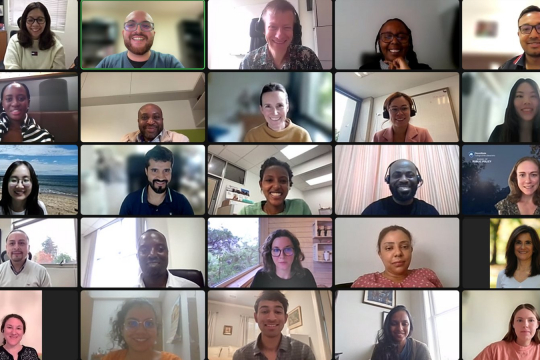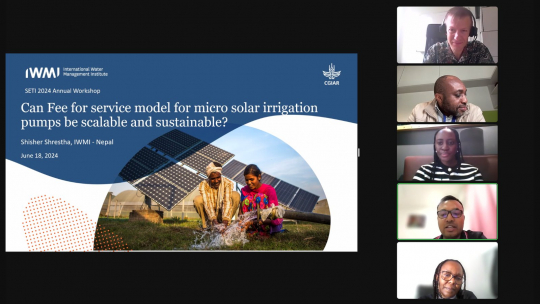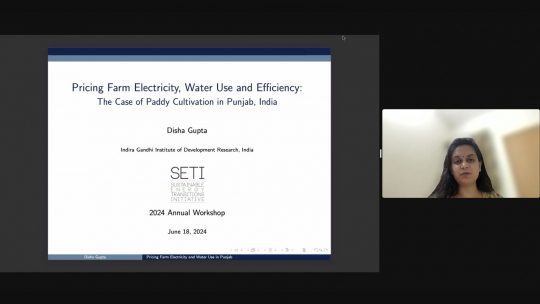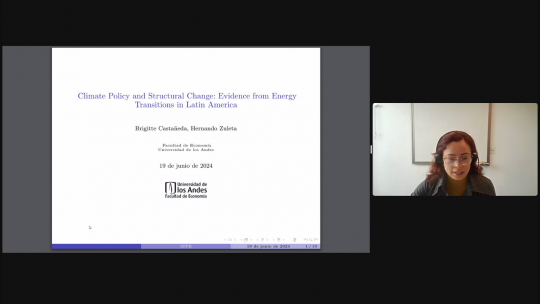The 2024 SETI Annual Workshop, held on June 18-19, brought together a vibrant network of researchers, policymakers, and students for an engaging exchange of ideas and groundbreaking research. The event highlighted the importance of collaboration and evidence-based policymaking in addressing the multifaceted challenges of global energy transitions, with a particular focus on the Global South.
The workshop underscored the global challenges of energy transition, tackling climate change, improving public health, and promoting gender equality. It showcased SETI’s work alongside the EfD network and other partners, demonstrating how collaborative efforts can advance sustainable energy solutions and support policymaking processes around the globe.
Focus on energy transition research in Africa
A key session addressed the low adoption of clean cooking energy in Uganda, where less than 6% of the population uses LPG (Liquefied Petroleum Gas). High initial costs and affordability issues were identified as major barriers. To overcome these challenges, targeted fiscal incentives were proposed. “LPG is being highlighted as a potential solution in our energy policy, in order to adjust the energy transition plan,” noted June Nyakahuma from Uganda’s Ministry of Finance.
Innovative model from Nepal was presented
In Nepal, an innovative fee-for-service model for micro-solar irrigation was showcased as a promising approach for smallholder farmers. This model, which integrates local entrepreneurship, offers a scalable solution for renewable energy. Shisher Shrestha from the International Water Management Institute highlighted that “while the solar program has promoted solar irrigation well, scalability still needs improvement.”
Improved cookstove implementation comes with challenges
Zambia’s experience with improved cookstoves revealed significant cost, functionality, and user preferences challenges. The session emphasized the importance of understanding local needs to ensure these cookstoves' effectiveness and cultural appropriateness. Wizaso Munthali, Lecturer from Copperbelt University, pointed out, “The failure of these improved cookstoves to sustain market share is a critical issue that needs addressing.”
The policy session concluded with a call for integrating research with policy to address energy transition challenges effectively. It highlighted the need for ongoing interactions between policymakers and researchers and identified political interference and funding shortages as major obstacles. Recommendations included focusing on policy coherence and aligning with both local and global energy transition goals.
Scientific evidence to support policymaking was shared
The workshop’s research presentations offered valuable insights into various facets of energy transitions. A session on energy poverty explored its spatial and social drivers, recommending targeted interventions to address it effectively at multiple levels. Another study from Chile highlighted how clean heating and thermal insulation programs can simultaneously improve air quality and energy efficiency.
In Nigeria, a simulation model analyzed the impacts of renewable energy subsidies on economic growth, employment, and greenhouse gas emissions. While the subsidies were found to work well, the study emphasized the importance of sustainable financing and green fiscal policies. A related discussion from Punjab, India, highlighted how free electricity for farms contributes to groundwater depletion, proposing a shift to volumetric pricing to manage water use more effectively.
The research sessions generated key recommendations for policymakers in many contexts. These included integrating women’s empowerment into energy initiatives, building adaptive capacity to manage climate risks, and prioritizing energy efficiency improvements across sectors. Additionally, the importance of public infrastructure in maximizing the educational benefits of electrification, particularly for girls, was underscored. The need for targeted fiscal incentives for clean cooking energy, promoting scalable renewable energy models like Nepal’s micro-solar irrigation, and tailoring energy transition policies to local needs were also highlighted as critical steps forward.
Flash-talks showcased valuable undergraduate research
The flash talks session at the SETI 2024 Annual Workshop provided innovative research by postgraduate students, highlighting the formation of advanced human capital in energy research. Each presentation offered unique insights into various aspects of energy transitions across different countries.
One study from Myanmar found that improved energy access significantly enhances women’s empowerment, particularly in business and financial agencies, underscoring the need to integrate energy initiatives with programs that elevate women’s societal roles. Another presentation examined the impact of climate vulnerability on global energy transitions, emphasizing the importance of building adaptive capacity and strengthening economic and governance readiness to manage climate change effects, thereby highlighting the critical role of resilience in energy policy planning.
In Ethiopia, a study on rural electrification revealed notable educational benefits, especially for girls, who spent more time on education and less on household chores, showing the broader social advantages of electrification. Lastly, a presentation on climate mitigation policies in Latin America emphasized the need for prioritizing energy efficiency improvements across sectors to achieve meaningful reductions in energy intensity, suggesting that targeted policies can drive significant progress in energy transitions.
These flash talks not only provided important insights but also underscored the essential role of postgraduate research in advancing our understanding of energy transitions. The session highlighted the importance of supporting young researchers in developing innovative and effective energy policies, a fundamental pillar of the SETI collaborative program.
A collaborative path forward
The SETI 2024 Annual Workshop offered evidence-based insights for policymakers, emphasizing the importance of collaborative efforts, tailored interventions, and scientific knowledge for policymaking. The discussions highlighted the diverse challenges and opportunities in energy transitions, underscoring the need for context-specific policies to achieve sustainable and inclusive outcomes.
If you are interested in accessing the materials from the workshop, please visit the SETI 2024 Annual Workshop website here. Additional information about the SETI network can be found on the EfD website here.



